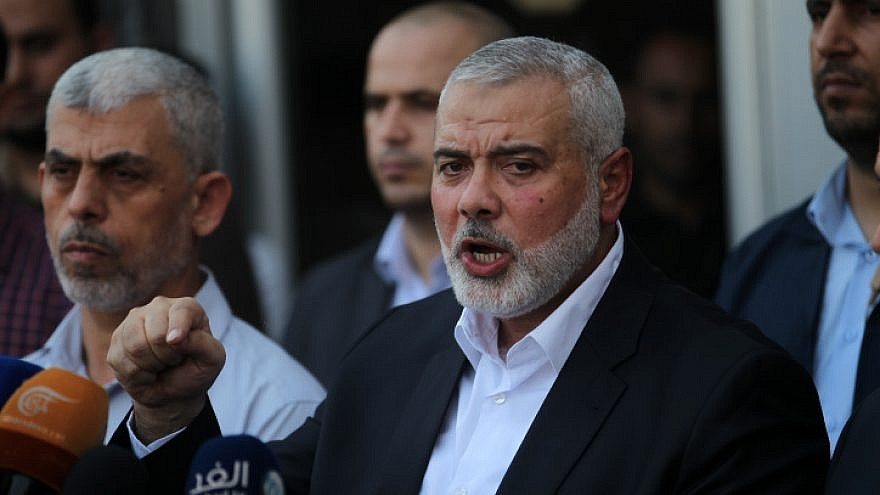A senior Hamas delegation arrived in Saudi Arabia late Monday, casting doubt on the prospect of peace between Jerusalem and Riyadh. The delegation includes Hamas politburo chief Ismail Haniyeh and the group’s foreign chief Khaled Mashaal.
According to Arabic media, Hamas hopes the visit will rekindle the previously strained relationship between the terror group and Riyadh.
Ties between Hamas and Saudi Arabia deteriorated in 2007 when the terror group seized control of the Gaza Strip in a bloody conflict with the Palestinian Authority. Since then Riyadh has blamed Hamas for the failed attempts to reach a peace settlement with the P.A. Furthermore, in 2019 Saudi Arabia arrested dozens of Hamas operatives for “threatening the stability of the kingdom.”
However, the recent rapprochement between Saudi Arabia and Iran has seen Riyadh thaw previously cold relations with many of Tehran’s proxies. Just last week the Saudi Foreign Ministry hosted a senior delegation from Syria in the first such meeting since 2011. Syrian Foreign Minister Faisal Mekdad met with his Saudi counterpart to achieve “a national reconciliation and…bring back Syria to its Arab fold and resume its natural role in the Arab world”
Furthermore, in the past few months, senior Hamas members have openly stated that they are interested in mending ties with the kingdom. Last month Hamas released a statement saying, “We affirm our keenness on positive relations with our brothers in Saudi Arabia and all brotherly countries in the service of the Palestinian cause and our Arab and Islamic nation.”
The current Israeli coalition has set expanding the series of landmark peace deals struck between Israel and several Arab states in 2020, known as the Abraham Accords, as its top foreign policy priority. In January, Prime Minister Benjamin Netanyahu said that normalizing relations with the Saudis would constitute a “quantum leap” for Israel’s regional stability.
While the initial reestablishment of ties between Saudi Arabia and Iran was seen by many analysts as not intended to signal a lack of interest in Saudi-Israeli peace, the more recent moves from Riyadh have experts worrying that Saudi Arabia may be shifting out of the U.S.-Israeli sphere of influence and to close to Tehran.
“These events are first of all a slam to the United States and by extension to Israel, and furthermore show a Saudi interest to not be seen as purely in the anti-Iranian camp,” said Professor Efraim Inbar, president of the Jerusalem Institute for Strategy and Security Affairs. “The Americans are not sufficiently committed, and Israel is not projecting toughness. We have domestic instability and we are not responding to major security threats with strength. If the Saudis see this for long enough they will leave the table,” Inbar added.
Indeed, in a report published on Monday, Channel 12 cited a source close to the Saudi monarchy as stating that “normalization with Israel is light-years away, Netanyahu’s government is amateurish and irresponsible.”
Inbar further explained that the new ties between the Saudis and Iran and its proxies do not signal true diplomatic warmth, but are certainly intended to send a stark message to the West. “To be clear, the Saudis know exactly what Iran is and they are certainly still enemies, but the current reality can lead to a real diplomatic step back for Israel, including a weakening of the already existing Abraham Accord agreements,” said Inbar.
Robert Silverman, a former top diplomat for the U.S. State Department in Riyadh and a lecturer on Middle Eastern and Islamic studies at Shalem College in Jerusalem, explained that he viewed the recent moves from Saudi Arabia not as a dramatic gesture of anti-Israeli policy but rather as a diplomatic shift in a broader, more convoluted geopolitical strategy.
“The status quo is certainly shifting further away from Saudi-Israeli normalization, but the narrative that the peace deal was around the corner, to begin with, was also patently false. Israeli-Saudi peace is a long process that will continue, but currently, that process is being negatively affected by American lack of involvement and Israeli instability,” said Silverman.
However, Silverman also explained that there were positive long-term trends also worth noting.
“Currently the Saudis are in a long process of removing antisemitic thinking from their country. This is a crucial positive move that may allow future normalization, that is continuing in the background of all of these negative diplomatic developments,” he said.
Silverman further said that the current stall in diplomatic initiatives between Israel and the already established Abraham Accords partners was a further sign of cooling ties between Israel and the Sunni world.
“The coalition has seen a major lack of high-profile visits to the Abraham Accords partners. There are some very major diplomatic players in the Abraham Accords, including Morocco and the United Arab Emirates, and cultivating those ties is crucial for warming ties with the rest of the region,” Silverman told JNS.
However, not all experts see the new ties between Saudi Arabia and the Iranian proxies as a negative thing.
According to Avi Melamed, a former Israeli intelligence officer and CEO of Inside the Middle East, Saudi Arabia’s new regional policy needs to be seen through a more nuanced lens.
Melamed believes that new ties “neutralize” Iran’s ability to exercise solitary control over its proxies.
“By embracing Hamas, and by embracing Syria, the Saudis are removing Iran as the only player in the field,” Melamed told JNS. “Increased Saudi influence in Syria and increased Saudi control in the Gaza Strip is in no way necessarily an anti-Israel policy,” he added.
Ultimately, he continued, “the Saudis are doing what is good for the Saudis,” and “the realities of the Iranian threat remain.” The Saudis, he said, “definitely still know where the danger comes from.”


























